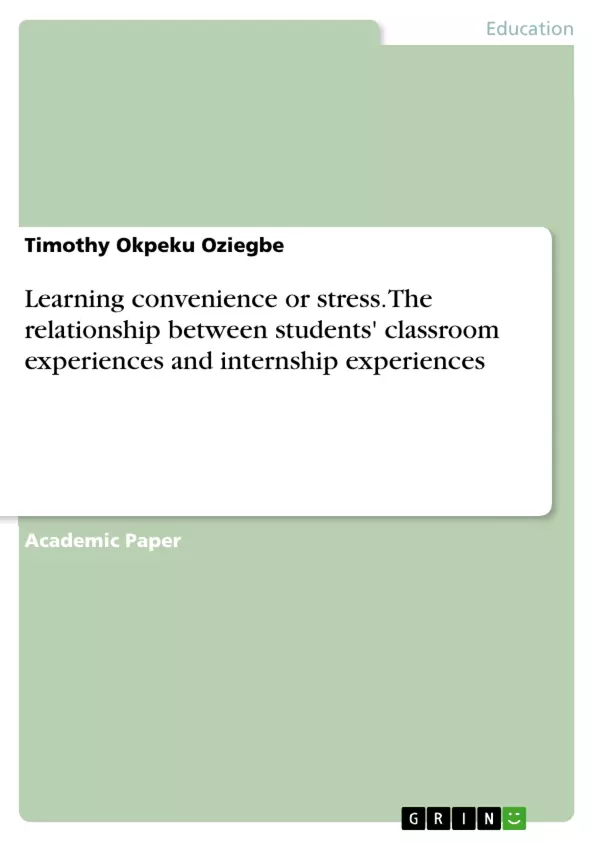This paper examines learning convenience or stress and its relationship between students' classroom experience and internship experience. The factors influencing students’ learning experience in the classroom, characteristics of students' internship experiences, and tips for internship sites were also examined.
Linking schools to industry must take into account student learning experiences in the classroom and student internship program. Colleges and universities are encouraged to develop their students' knowledge, skills, interest, and potential to follow industry trends and meet industry needs. This experience could make it easier for students to learn and develop their overall skills, both in school and in the workplace. In addition, schools could help students acquire core skills needed in the future and recognize the need for cross-cultural relationships. Schools could also establish internship programs to connect schools with businesses that could grow a new generation of talent that will become the mainstay of school talent development in the face of global competition.
Inhaltsverzeichnis (Table of Contents)
- Learning convenience
- Learning Stress
- The student's classroom learning experience
- Factors influencing student's learning experience in the classroom
- Language
- Age
- Gender
- Cultural background
- Students' internship program
- Characteristics of the internship program
- Administration
- School Policy
- Gaining experience
Zielsetzung und Themenschwerpunkte (Objectives and Key Themes)
This paper examines the relationship between students' classroom experiences and their internship experiences, focusing on the concepts of learning convenience and learning stress. It explores factors that contribute to both positive and challenging learning environments within the classroom and during internships. The paper aims to identify strategies and insights that can enhance student learning and prepare them for their future careers.
- Learning convenience and its relationship to classroom and internship experiences
- Factors influencing students' learning convenience and stress in the classroom
- Characteristics and benefits of internship programs for student development
- The role of inclusive classroom experiences and the impact of teacher practices on student learning
- The importance of considering student differences, abilities, and learning styles in creating effective learning environments
Zusammenfassung der Kapitel (Chapter Summaries)
The paper begins by defining the concept of learning convenience as a state of ease and stress-free learning, highlighting the role of teachers in facilitating this process. It then explores the factors that can hinder learning convenience, such as emotional intelligence, instructional effectiveness, and cross-cultural interactions.
The paper then discusses learning stress as a consequence of a mismatch between student effort and learning demands. It explores factors contributing to learning stress, including overcrowded classrooms, insufficient funding, and lack of political will. The paper also examines strategies for reducing learning stress, such as providing incentives, improving facilities, and implementing blended learning approaches.
The paper then delves into the student's classroom learning experience, encompassing various learning styles and the importance of inclusive classroom environments. It emphasizes the role of teachers in considering students' individual differences, abilities, and learning styles to create effective and engaging learning experiences.
Finally, the paper examines students' internship programs as an integral part of their learning journey. It explores the benefits of internships in gaining practical experience, developing professional skills, and reducing learning stress. The paper concludes by outlining key characteristics of internship programs, including administration, school policies, and the importance of gaining practical experience.
Schlüsselwörter (Keywords)
This paper focuses on the key concepts of learning convenience, learning stress, classroom experience, and internship programs. It examines the factors influencing student learning in both academic and professional settings, highlighting the importance of inclusive practices, effective instruction, and real-world experiences in shaping student development.
Frequently Asked Questions
What is "learning convenience" for students?
It refers to a state of ease and stress-free learning where teachers facilitate a supportive environment that matches students' learning styles.
What causes learning stress in the classroom?
Factors include overcrowded classrooms, a mismatch between effort and demands, lack of resources, and ineffective instructional methods.
How do internships help reduce student stress?
Internships bridge the gap between theory and practice, allowing students to gain professional skills and practical experience, which builds confidence.
Which factors influence classroom experiences most?
Language, age, gender, and cultural background are key factors that shape how a student perceives and interacts with the learning environment.
How can schools better connect with the industry?
By developing internship programs that align with industry trends and fostering cross-cultural relationships to prepare students for global competition.
- Citation du texte
- Dr. Timothy Okpeku Oziegbe (Auteur), 2023, Learning convenience or stress. The relationship between students' classroom experiences and internship experiences, Munich, GRIN Verlag, https://www.grin.com/document/1324481



